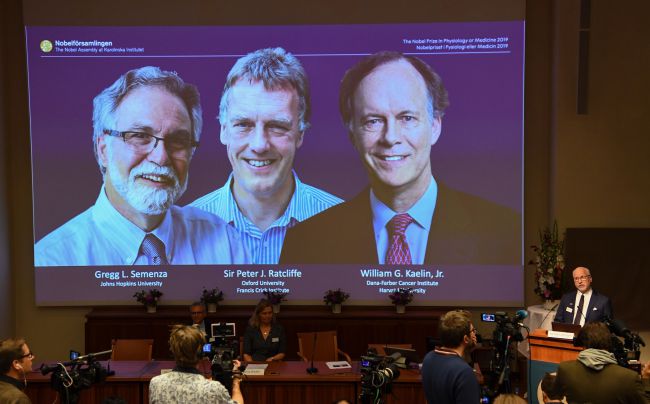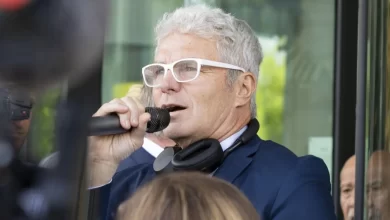International NewsScienceTechnology
Trio Wins Nobel Prize in Medicine for Figuring Out ‘One of Life’s Most Essential Adaptive Processes’
Nobel Assembly member, Randall Johnson, speaks during the announcement of this year’s winners of the Nobel Prize in Physiology or Medicine, at the Karolinska Institute in Sweden: (from left to right on the screen) Gregg Semenza, Peter Ratcliffe and William Kaelin.

This year’s Nobel Prize in physiology or medicine has been awarded jointly to three scientists who figured out how cells sense and adapt to changes in levels of oxygen, the Nobel Assembly at Sweden’s Karlinska Institute announced this morning (Oct. 7).
The three Nobel Laureates, William G. Kaelin Jr, Sir Peter J. Ratcliffe and Gregg L. Semenza, identified the molecular machinery that turns the activity of genes up or down in response to varying levels of oxygen.
“The seminal discoveries by this year’s Nobel Laureates revealed the mechanism for one of life’s most essential adaptive processes,” according to the Nobel Prize organization.
The ability of cells to detect oxygen levels and respond is essential to keeping the body functioning and can play a big role in some diseases. At the most basic level, cells need oxygen to convert food into energy.
“Cells and tissues are constantly experiencing changes in oxygen availability. As an embryo grows and develops, as muscles work, the oxygen available changes as the tissues themselves change,” a member of the Nobel committee, Randall Johnson, said this morning during the announcement in Sweden. “Cells need a way to adjust to the amount of oxygen they have while still doing their important jobs.”
For instance, during intense exercise, muscle cells must adapt to higher oxygen demands. Oxygen-sensing machinery is essential for fetal development, as it controls normal blood vessel formation and the development of the placenta, the Nobel Prize organization wrote. The machinery also plays a role in anemia and even cancer — stimulating the formation of blood vessels so cancer cells can spread.
Semenza was born in New York and performed his prize-winning research at Johns Hopkins University in Baltimore, where he continues to do research. Ratcliffe was born in Lancashire in the U.K., and he is currently at the University of Oxford and the Francis Crick Institute in London, where he also did his prize-winning work. Kaelin was also born in New York and carried out his prize-winning research at the Dana-Farber Cancer Institute in Boston, where he is still active.
The three scientists will share equally the Nobel prize of 9 million Swedish kronor (about $909,000).
SOURCE: LIVE SCIENCE




